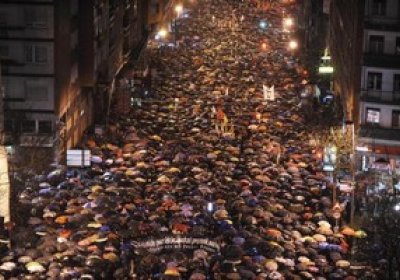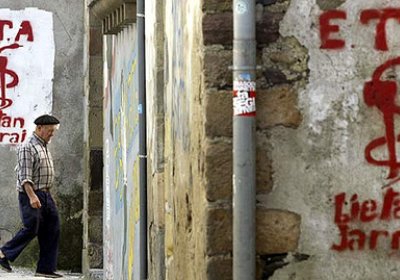Anyone in Spain with the slightest understanding of human rights’ law knew that the Grand Chamber (full bench) of the European Court of Human Rights was bound to reject the appeal of the Spanish government over the case of convicted Basque Homeland and Freedom (ETA) prisoner Ines del Rio.
For decades, ETA waged an armed struggle for independence for the Basque Country from the Spanish state. In 2011, it declared a “permanent ceasefire”, ending its armed campaign.
Basque Country
A crowd of at least 60,000 marched through central Bilbao on October 5 in protest against the arrest of 18 activists of Herrira (“To The People”) by the Spanish state. The group advocates for the rights of Basque political prisoners.
The march was called by EH Bildu, the left-nationalist alliance in the Basque regional parliament, as well as by the two Basque nationalist trade union confederations and 50 other social movements. It came after a wave of local protests against the raid on Herrira.
Nearly 10 years after the Spanish high court outlawed previous Basque left nationalist political groups, the movement has finally given birth to a new legal party ― Sortu (“to create” or “to be born” in Basque).
The new arrival is a powerful force for Basque independence and progressive politics in the Spanish state ― socialist, feminist, ecologically aware and staunchly internationalist.
An estimated 115,000 people marched in Bilbao, in the Basque Country in the north of the Spanish state, on January 12, undeterred by pouring rain and near-freezing conditions. Protesters demanded the repatriation to the Basque Country of hundreds of Basque political prisoners held by the Spanish state.
The results of October 21 election for the parliament of Euskadi, the Basque autonomous community within the Spanish state, are expected to confirm the rising popularity of the left nationalist coalition, Euskal Herria Bildu (EH Bildu―Basque Country Assembly).
Regardless of whether EH Bildu tops the vote or is pipped by the conservative Basque Nationalist Party (PNV), progressive politics in Euskadi seems certain to record its best ever result.
Amid the worldwide media coverage of Libyan dictator Muammar Gaddafi’s death, a historic development in another conflict went largely unnoticed.
After more than 40 years of a military campaign against the Spanish state, the Basque armed group ETA announced a permanent end to its use of violence in the struggle for an independent and socialist Basque state.
This follows previous announcements from the group, declaring a desire to pursue independence for the Basque Country through peaceful measures.
On September 5, the Basque armed group Euskadi Ta Askatasuna (Basque Homeland and Freedom, ETA), which has fought an armed struggle for Basque freedom for decades, released a video declaring that several months ago it had decided to stop armed actions, and announced a ceasefire.
- Previous page
- Page 3






